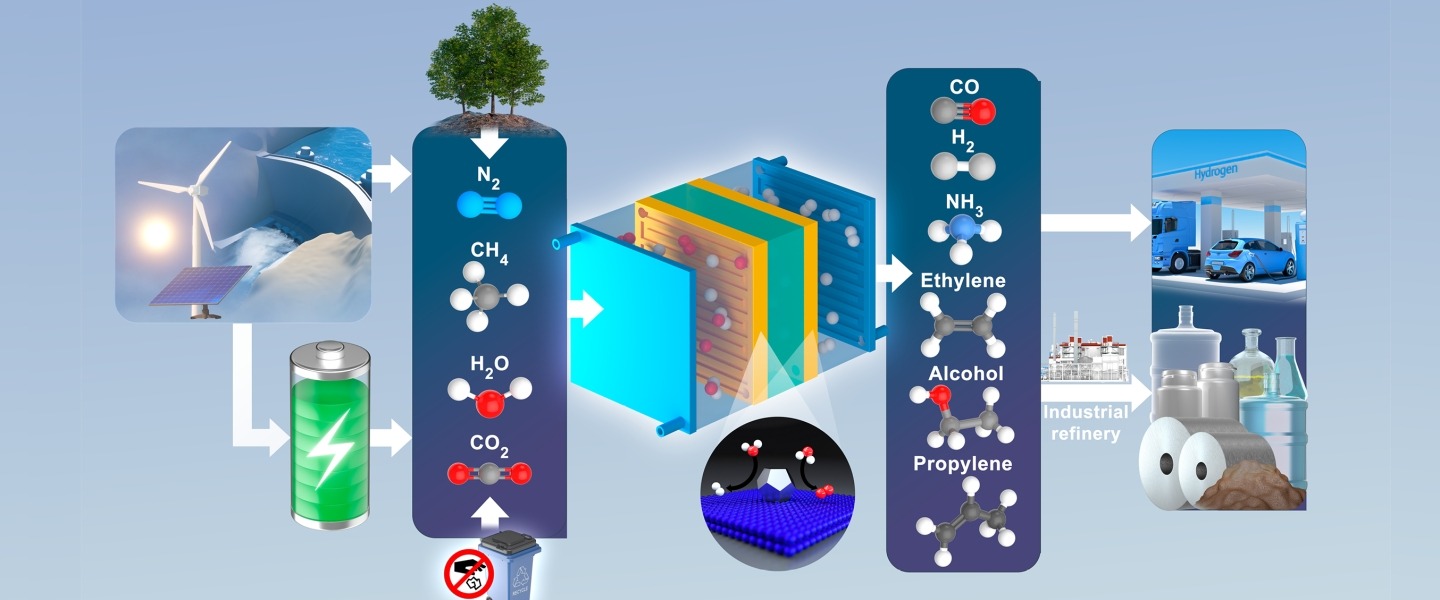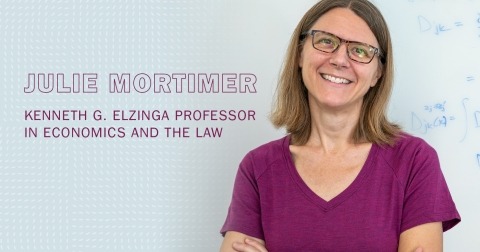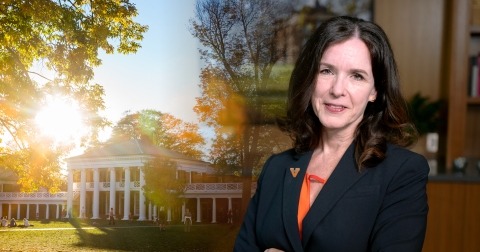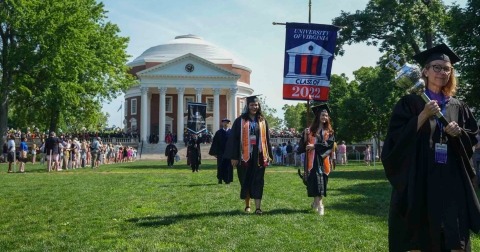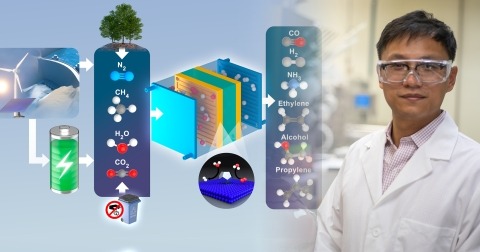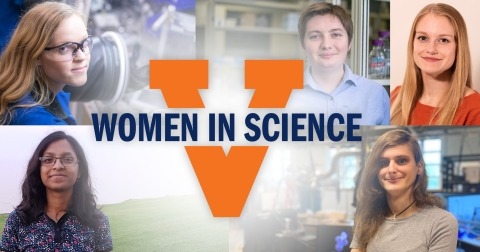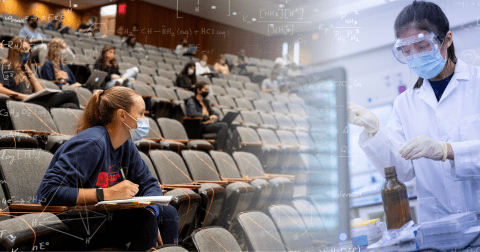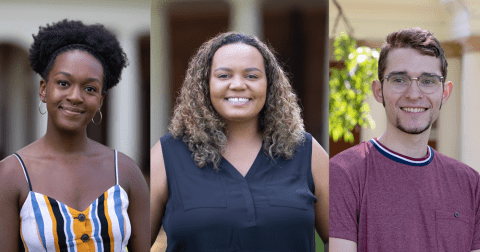The challenge of producing renewable fuel and chemical sources for a clean energy future has drawn the focus of researchers around the world. In recent years, a young faculty member in UVA’s College and Graduate School of Arts & Sciences has drawn attention and acclaim for the innovative efforts of his lab in this critical area of research and enriched the experience of his chemistry students.
Since his arrival at the University of Virginia in 2016, assistant chemistry professor Sen Zhang has been awarded research grants in excess of $5 million from agencies such as the National Science Foundation and the Department of Energy.
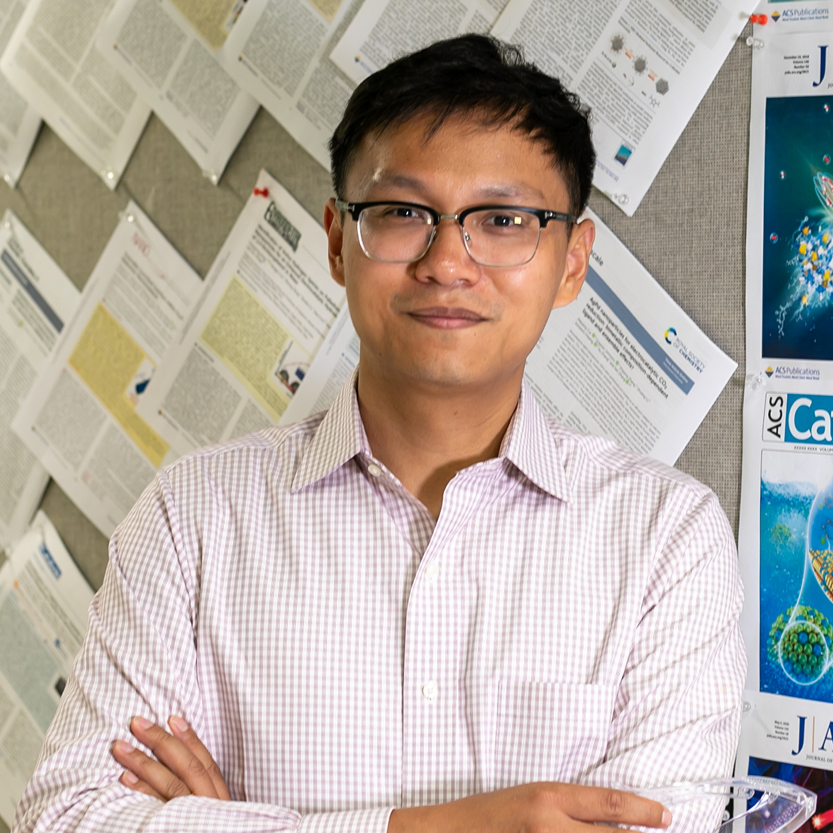 Sen Zhang, Assistant Chemistry Professor. Credit: Molly Angevine
Sen Zhang, Assistant Chemistry Professor. Credit: Molly Angevine
His honors and recognitions include being named a 2020-22 Scialog Fellow for Negative Emissions Science by the Research Corporation for Science Advancement and the Alfred P. Sloan Foundation; an “Emerging Investigator” by the Journal of Materials Chemistry and Nanoscale; and inclusion in Frontiers in Chemistry’s “2020 Rising Stars in Chemistry” list.
Most recently, Zhang was awarded a 2022 Sloan Foundation Fellowship, a designation reserved for 118 early-career scholars considered to be the most promising scientific researchers working today. That fellowship came this spring on the heels of an NSF CAREER Award, another prestigious award reserved for early-career faculty deemed to be at the forefront of their fields. The awards and grants serve as international recognition of the potential for scientific breakthroughs in Zhang’s work studying catalysts to efficiently oxidize renewable alcohols to produce clean electricity and valuable chemicals.
“Professor Zhang is an outstanding scientist at the forefront of nanomaterials research for energy applications,” said Jill Venton, chair of the College and Graduate School of Arts & Sciences’ Department of Chemistry. “And his impact is felt not only through his research. In the classroom, he works with our first-year science major students to design their first lab experiences and capture their interest in chemistry.”
Progress through collaboration
Zhang grew up in Hefei, the capital of China’s Anhui Province, and earned his Ph.D. in inorganic chemistry nine years ago at Brown University. Since his arrival on Grounds, Zhang has assembled a research group focused on deepening our atomic-level understanding of electrocatalysts and thermal catalysts and their role in critical energy conversion and chemical transformation processes.
In 2021, a collaboration with College and Graduate School of Arts & Sciences chemistry professor T. Brent Gunnoe and researchers from the California Institute of Technology and the U.S. Department of Energy’s Argonne National Laboratory, Lawrence Berkeley National Laboratory and Brookhaven National Laboratory led to a new strategy to produce a new form of catalyst using the earth-abundant elements cobalt and titanium. Inefficiencies in the storage and distribution of solar power have stymied efforts to make solar energy practical on a large scale. Zhang and Gunnoe’s new process, which involves creating active cobalt catalytic sites on the surface of titanium oxide nanocrystals to catalyze water electrolysis to produce hydrogen fuel using solar electricity, could be an innovative chemical solution.
“New approaches to efficient oxygen evolution reaction catalysts and enhanced fundamental understanding of them are key to enabling a cost-effective water electrolysis technology and a possible transition to scaled-use of renewable solar energy,” said Zhang, who was recognized by UVA in January with a Research Excellence Award.
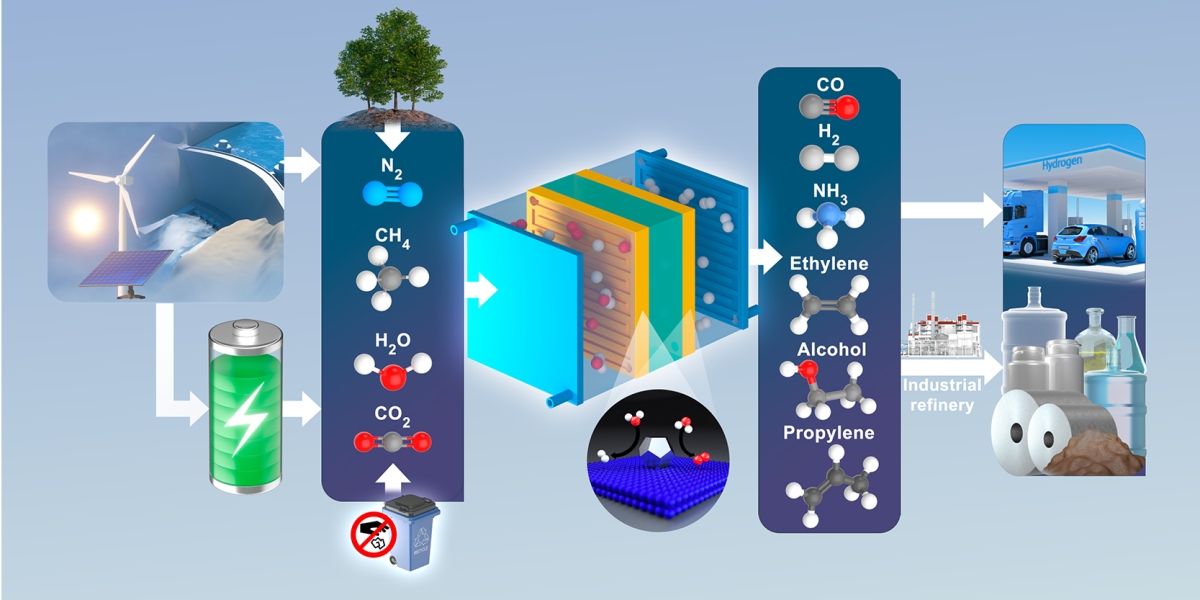 Using green electricity and electrochemical processes, valuable chemicals and fuels are produced from the electrochemical conversion of small molecules (H2O, CO2, N2, O2, CH4 etc.) and renewable feedstocks (biomass, wastes). Developing active and durable catalysts from earth-abundant materials is critical to improving and optimizing both the energy efficiency and cost-effectiveness of the electrochemical transformations.
Using green electricity and electrochemical processes, valuable chemicals and fuels are produced from the electrochemical conversion of small molecules (H2O, CO2, N2, O2, CH4 etc.) and renewable feedstocks (biomass, wastes). Developing active and durable catalysts from earth-abundant materials is critical to improving and optimizing both the energy efficiency and cost-effectiveness of the electrochemical transformations.
Zhang’s collaborations on Grounds also include a project with colleagues in UVA’s School of Engineering & Applied Science. Working with engineering professors Robert J. Davis and Lisa Colosi-Peterson and researchers from the National Renewable Energy Laboratory, Zhang was awarded a $2.3 million U.S. Department of Energy grant for a renewable natural gas project last year.
It was part of a DOE initiative funding 22 projects focused on developing technologies and processes that produce low-cost, low-carbon biofuels. Airplanes, ships and other heavy-duty vehicles are difficult to electrify with current technologies, but biofuels — made up of renewable resources — could potentially power such heavy-duty vehicles and help accelerate the United States’ efforts at pursuing a net-zero emissions economy.
The goal for Zhang, Davis and Colosi-Peterson’s project is to develop a low-temperature methanation process to directly convert the carbon dioxide in biogas to CH4, potentially making it capable of producing pipeline quality renewable natural gas.
“If this succeeds, this innovation will lead to improvements in energy efficiency, operational cost and carbon management in the use of catalyst materials for biogas-to-renewable natural gas conversion processes.” - Sen Zhang
“Biogas from various sources, including wastewater treatment plants and landfills, can serve as a resource to produce renewable natural gas. Our strategy is to create a highly active, durable and selective nickel-based CO2 methanation catalyst that allows the direct transformation of carbon dioxide in biogas to methane at low temperatures,” Zhang said. “If this succeeds, this innovation will lead to improvements in energy efficiency, operational cost and carbon management in the use of catalyst materials for biogas-to-renewable natural gas conversion processes.”
“It’s incredibly exciting to imagine that we could convert CO2 into renewable natural gas, because this would give us heavy-duty transportation fuels that are effectively ‘carbon neutral,’” Colosi-Peterson said. “This means that the amount of carbon dioxide that is created when the fuel is combusted (used) is canceled out by roughly the same amount of carbon dioxide being taken up out of the atmosphere when the fuel is created. This would help us dramatically decarbonize heavy-duty transportation, which is a key driver of our overall emissions budget.”
Impacting student success
To be considered for NSF CAREER awards, early-career faculty not only must be among the emerging leaders of their fields, they also must display leadership in the classroom.
In the past, Zhang organized symposia and center grants for clean energy research, contributing a key role in UVA’s strategic goal of improving sustainability. In addition to using the $616,080 in CAREER funding for his research, Zhang plans to develop a series of education plans and outreach activities, with an emphasis on the development of a “iCleanEnergy” teaching platform to enable active and customized learning for undergraduate clean energy education.
 Sen Zhang with a group of graduate students and postdocs from his lab at King Family Vineyards. From left to right, front row: Chang Liu, Xiangru Wei, Meiyang Cui, Yulu Zhang, Liyue Zhang, Shen-Wei Yu. From left to right, back row: Bukuru Anaclet, Grayson Johnson, Perrin Godbold, Zhouyang Yin.
Sen Zhang with a group of graduate students and postdocs from his lab at King Family Vineyards. From left to right, front row: Chang Liu, Xiangru Wei, Meiyang Cui, Yulu Zhang, Liyue Zhang, Shen-Wei Yu. From left to right, back row: Bukuru Anaclet, Grayson Johnson, Perrin Godbold, Zhouyang Yin.
The project will also involve educational outreach to minority-serving institutions to increase minority participation in the energy sector. It's a project he looks forward to seeding as fertile soil for the next generation of clean energy researchers.
“This is just one way to develop a technology to utilize renewable resources efficiently, on a large scale,” Zhang said of his research group’s efforts. “There are so many more opportunities for collaboration to explore.”

